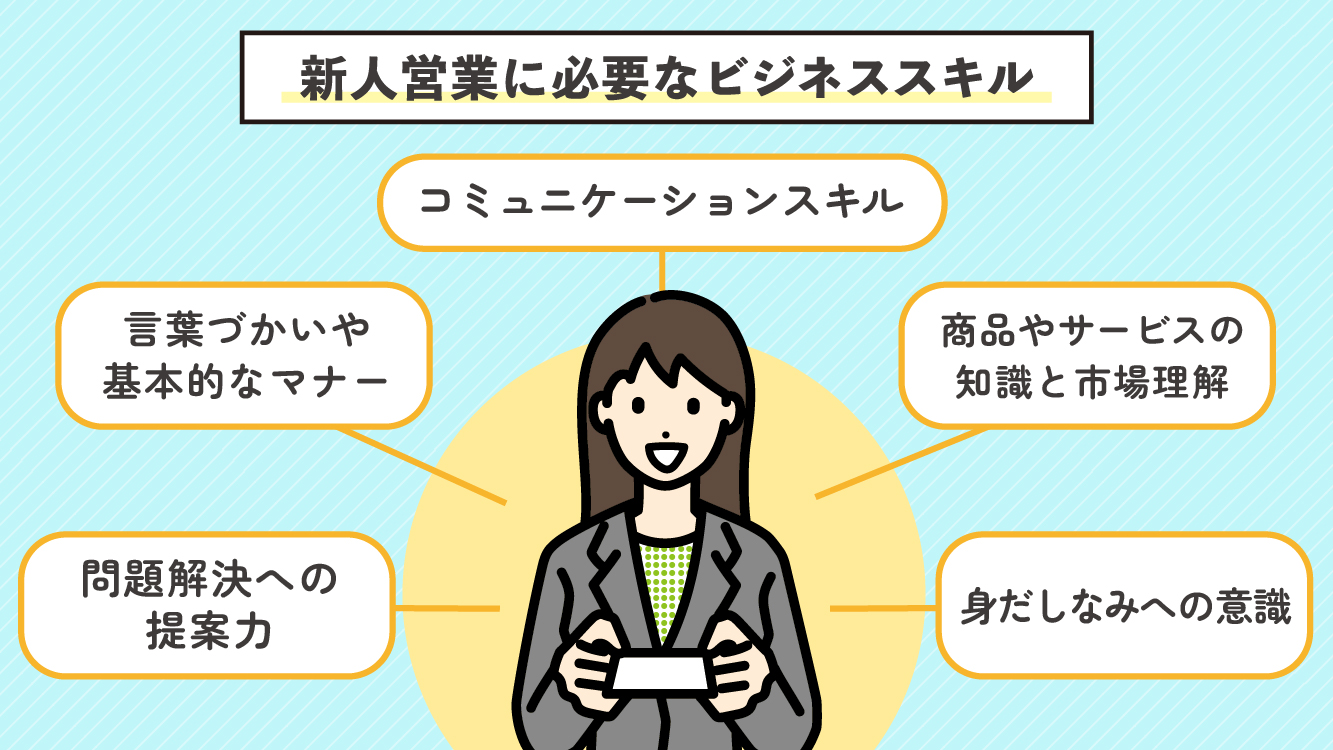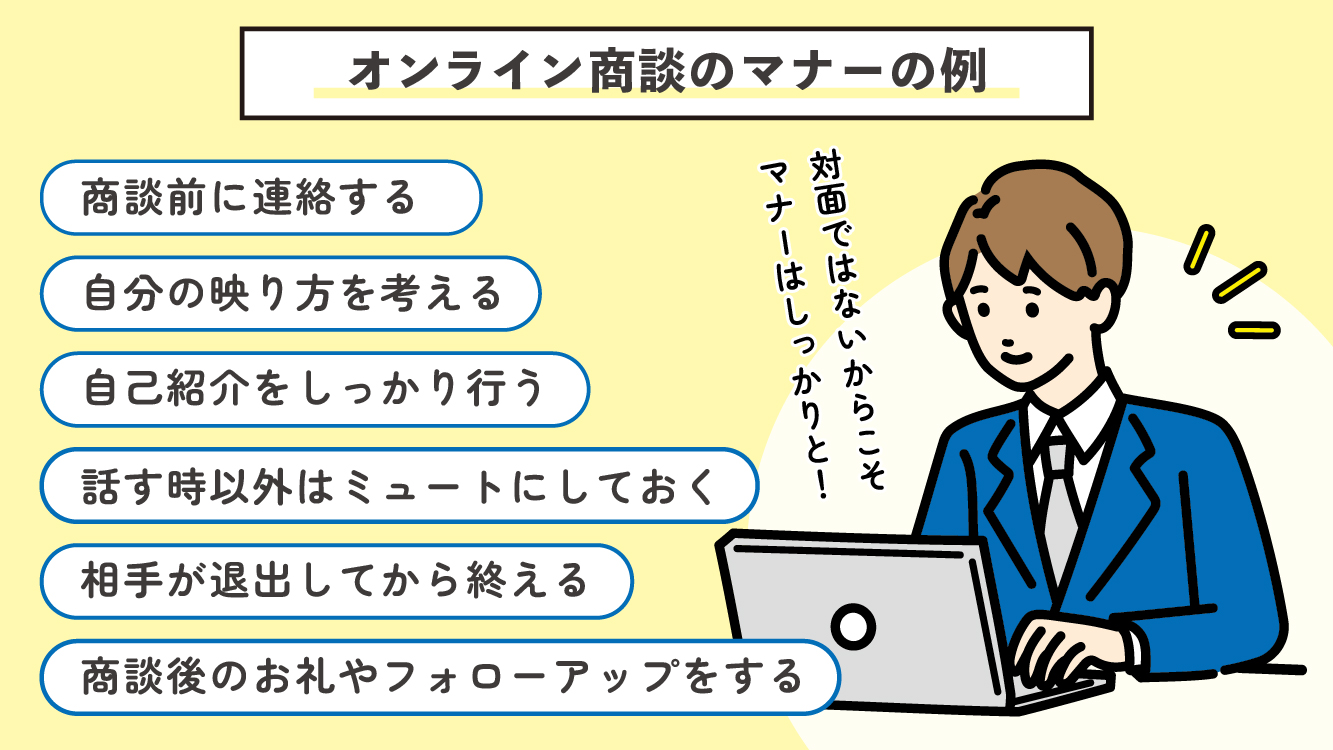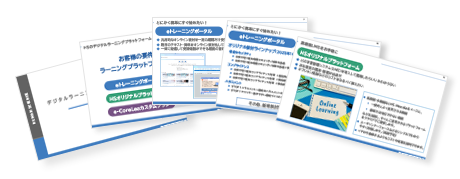2024.07.24
What business skills should be taught in etiquette training for new sales staff? Essential for sales accompaniment and online meetings.

Sales positions play a crucial role in supporting the growth of a company. Therefore, it can be said that it is an important process for new employees in sales to learn the "basics of business" through training.
This blog will focus on the theme of "Etiquette Training for New Sales Representatives," explaining the key points of training from various angles, including the business skills required for new sales representatives, etiquette in online meetings, and the importance of language use.
1. Essential Business Skills for New Sales Representatives
First, let's organize the business skills that new salespeople should acquire.

1. Language Use and Basic Manners
Appropriate language use demonstrates politeness and reliability to clients. Furthermore, using clear and concise language helps prevent misunderstandings and facilitates smooth communication. Additionally, manners during first meetings greatly influence the client's first impression. By creating a good first impression, it leads to smoother relationships thereafter. Both are essential skills for building trust with clients.
Communication Skills
For sales positions, communication with customers is the core of the business. To provide optimal proposals and services, it is important to enhance the "listening skills" and "questioning skills" towards customers, accurately grasping their needs and requests. Additionally, the ability to clearly convey the value of one's own products and services, known as "communication ability," and the speed of response, referred to as "response speed," are also part of communication skills.
3. Proposal Skills for Problem Solving
In sales activities, it is important to develop "high-resolution proposal skills" by specifically understanding the customer's challenges and deriving the optimal solutions for them. To achieve this, one can consider methods such as referencing past cases to explore responses to similar issues or seeking advice from superiors and seniors.
Knowledge and Market Understanding of Our Products and Services
By deeply understanding our products and services, we can make appropriate proposals to customers, which in turn can lead to contract establishment and increased customer satisfaction. Additionally, understanding the market is also important. By grasping market trends and the products of competitors, we can highlight the advantages of our products and services, which is helpful in formulating sales strategies and determining the direction of marketing activities.
5. Awareness of Appearance
For sales positions that frequently meet with clients, awareness of appearance is essential. Proper grooming is seen as part of demonstrating trustworthiness and professionalism. A clean appearance leaves a good impression on clients and helps build trust.
Points for Appropriate Grooming
●Attire: Simple and calm-colored suits or business casual. Pay attention to details such as wrinkles on shirts and dirt on shoes. Avoid excessive accessories and decorations.
●Hairstyle: Maintain a neat hairstyle without disorder for a clean appearance.
●Personal Cleanliness: Take care of facial hair and nails, and ensure proper dental hygiene and breath freshness.
What we have introduced here is just one example, but these skills form the foundation for building trust with clients and facilitating effective communication.
2. Methods Suitable for Training New Sales Representatives

Sales positions often involve direct interaction with customers, so it is essential to develop flexible response skills on the spot. Therefore, it is important to incorporate practical skill-building methods in training, in addition to classroom learning.
Below, we have picked up methods suitable for training new sales representatives.
Method 1: Sales Accompaniment
New employees accompany their supervisors or seniors to the field, experiencing actual customer visits and business negotiations, allowing them to learn practical skills. Real-time feedback is also effective.
Method 2: Role Playing
Supervisors and senior colleagues play the roles of customers or competitors, allowing newcomers to refine their sales skills in response. Various scenarios are assumed, and growth is encouraged through immediate feedback.
Method 3: Case Study
We will examine past success and failure cases to learn the countermeasures and ways to address mistakes that can be derived from them. By applying the knowledge acquired in lectures to real-life scenarios, we connect theory to practice.
Method.4 e-Learning
e-Learning is very effective for self-study and repetitive learning. It allows for learning regardless of time and place, making it possible to utilize gaps in time during travel for sales activities or waiting periods. Areas where understanding is insufficient can be reinforced through repeated learning.
By solidifying foundational knowledge through classroom learning, engaging in self-paced study via e-learning, and acquiring practical skills through role-playing and accompanying sales, it is expected that the sales capabilities of new employees will be significantly improved.
3. Be Mindful of Etiquette in Online Meetings

With the spread of remote work and online meetings, online business negotiations have become common in sales situations. Communication with clients occurs through the PC screen, but because it is not face-to-face, it is necessary to learn the unique etiquette of online business negotiations.
●The Importance of Etiquette Training in Online Business Meetings
Reason 1: Increase and Spread of Online Business Meetings
Due to the impact of the COVID-19 pandemic, online business meetings have rapidly spread alongside remote work. To overcome the unique communication challenges of online interactions, it is essential to acquire basic etiquette.
Reason 2: Online Means You Can't Let Your Guard Down
In online business meetings, non-verbal communication such as gestures and facial expressions is harder to convey compared to face-to-face interactions, so it is necessary to pay more attention to language use and facial expressions. Additionally, since technical issues can arise, it is essential to check equipment and software in advance and not neglect preparation.
Reason.3 Records are kept and may be reviewed later
Online business negotiations can be used as evidence that may be reviewed later or to prevent future troubles. In other words, your behavior at the moment will be recorded. To avoid misunderstandings and mistakes, let's be mindful of accurate manners and conduct during negotiations.
Specific manners for online business meetings include the following.
●Examples of Online Meeting Etiquette

1. Contact Before the Meeting
As the scheduled date for the meeting approaches, it is advisable to confirm the date, time, participants, and the availability of any preliminary materials, just to be safe. This helps avoid unexpected troubles. It is especially important to reach out in advance for meetings involving many participants or requiring complex scheduling.
Consider How You Appear
Before starting a business meeting, think about how you appear on the screen and make necessary adjustments. Specifically, ensure that the camera is positioned in front of you, and that your face is clearly and brightly visible. Also, pay attention to the background, making sure it is not cluttered and that your privacy is secured.
3. Conduct a Proper Self-Introduction
In face-to-face business meetings, it is common to exchange business cards at the beginning. However, in online meetings, discussions may start immediately, so be sure to conduct a proper self-introduction during greetings. Additionally, since you may not have a business card on hand, it is important to accurately remember the other person's name and be mindful not to make mistakes.
Keep muted when not speaking
Make sure to stay muted when you are not speaking. This helps prevent background noise and audio from other participants on your PC from disrupting the meeting. Especially in meetings with many participants, keeping muted can help avoid unnecessary confusion due to the different environments of each participant.
5. End after the other party exits
After the online business meeting concludes, participants will "exit" the meeting. At that time, the salesperson, who is in the position of a visitor, should be careful not to exit before the other party. This is an act of showing respect to the other party and also helps to avoid giving an unpleasant impression.
6. Send Thank You Notes and Follow Up After Meetings
After a meeting, expressing gratitude can leave a positive impression on the other party. Additionally, it is important to reconfirm the details and decisions shared during the meeting to ensure there are no misunderstandings or unclear points. If there were any requests made by the other party during the meeting, be sure to address them promptly.
Communication in online meetings has different characteristics compared to face-to-face interactions. By adhering to proper etiquette during conversations, you can avoid confusion and misunderstandings, which helps build trust with clients. As a result, you can also expect to gain future business opportunities and partnership prospects.
4. How to Acquire Proper Language Usage for the New Generation

Learning proper language usage can be said to be the foundation of business etiquette, and it holds particularly significant meaning for new salespeople. The reason is that for sales professionals, language is a "tool of the trade," and correct language usage is essential for acquiring business and building relationships with customers.
This chapter introduces methods for the younger generation of newcomers to acquire proper language usage.
1. Imitate Excellent Models
To acquire the correct use of language, starting with imitation is effective. By mimicking the statements and responses of excellent senior employees, you can naturally absorb knowledge.
Learning Through Reading
Learning from specialized books such as etiquette books and business books is one approach. By discovering new expressions and phrases through reading and incorporating them into your work and daily communication, you can improve your language usage.
3. Conduct Practical Exercises and Role Plays
By providing opportunities for role plays and simulations based on actual work scenarios, you can acquire practical language skills with applied abilities that cannot be gained through classroom learning. The slight tension and stress felt during this process also enhance the learning effect.
4. Correcting Incorrect Language Usage
In the younger generation of newcomers, there are cases where they may recognize expressions of respect incorrectly, or use slang and neologisms that are understood among peers in a professional context. It is important to point out mistakes immediately when noticed and to correct them to accurate language usage.
5. Regular Learning and Reflection
Since language usage is often not fully mastered after just one learning session, regular learning and reflection are key. Watching business etiquette videos, learning in a quiz format, and engaging in e-learning are all ways to choose a learning style that suits you, which is the trick to successful continuation.
Through methods like this, new salespeople will be able to interact with customers confidently by acquiring the correct use of language.
5. Summary

It is expected that new sales representatives acquiring proper business manners and language will lead to various benefits, such as building trust with customers, improving the quality of communication, and enhancing corporate evaluation and performance. In other words, for companies, business etiquette training for new sales representatives is not merely a method for skill enhancement, but it is an important investment towards sustainable growth and success.
E-learning is a tool that enhances the learning effects of business etiquette training.
Human Science offers various business etiquette materials for new hires and prospective employees.
One of them, "The Basics of Business Manners: Language Usage Edition," clearly explains the types and usage of honorifics, commonly used expressions and phrases in business, and language that creates a positive impression, using photos and illustrations.
For more details, please visit the e-learning site of Human Science.
>e-Learning Material "Fundamentals of Business Etiquette: Language Usage Edition"
Based on this teaching material, if you add your company's unique manners and rules, I believe it can be utilized as an even more useful teaching resource. Please feel free to consult us regarding customization or production of the materials.












